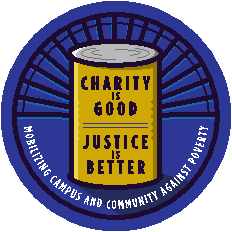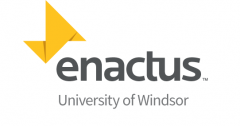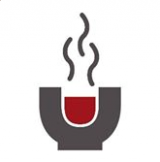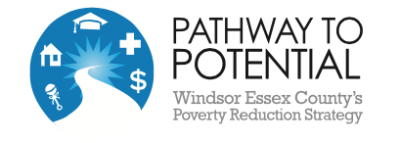by Amanda Lefrancois, CFICE Poverty Hub RA
Students are playing their part in Windsor’s Poverty Reduction movement in many different ways. Below are just a few examples of how students are making a difference.
- Charity Is Good, Justice Is Better: Mobilizing Campus and Community against Poverty

Charity is Good, Justice is Better Logo
On October 2, 2015, Pathway to Potential (P2P) hosted the event Charity Is Good, Justice Is Better: Mobilizing Campus and Community against Poverty at the University of Windsor. The workshop brought together students, faculty and community members with the shared goal of campus-community engagement (CCE) and action efforts to fight local poverty. Nearly one-third of individuals who signed up for the event were students and three out of the ten panelists were students at the University of Windsor. Some of the issues discussed include challenges surrounding poverty within Windsor-Essex County and how the University of Windsor could implement more internships and campus volunteer opportunities to strengthen CCE. Interactive breakout sessions occurred on various topics such as implementing a living wage, making poverty a federal election issue, food justice and missing and murdered indigenous women. For more information on becoming involved for the second Justice is Better workshop, email msw@pathwaytopotential.ca.
- Windsor SOUP
 Windsor SOUP was created through collaboration with P2P and Enactus, which is a group of University of Windsor students determined become a major catalyst for economic change through community-focused and entrepreneurial-based projects. Windsor SOUP facilitates creative initiatives or projects that aim to better the Windsor-Essex community in the areas of art, urban agriculture, social justice, social entrepreneurship, education and technology. With a minimum $5 donation, attendees of Windsor SOUP receive soup, salad, bread and a vote for which of the presented community projects they would like to see win a microloan. The night facilitates networking with community members by sharing resources and a nutritious meal.
Windsor SOUP was created through collaboration with P2P and Enactus, which is a group of University of Windsor students determined become a major catalyst for economic change through community-focused and entrepreneurial-based projects. Windsor SOUP facilitates creative initiatives or projects that aim to better the Windsor-Essex community in the areas of art, urban agriculture, social justice, social entrepreneurship, education and technology. With a minimum $5 donation, attendees of Windsor SOUP receive soup, salad, bread and a vote for which of the presented community projects they would like to see win a microloan. The night facilitates networking with community members by sharing resources and a nutritious meal.
 Check out Enactus’ Facebook and their official website.
Check out Enactus’ Facebook and their official website.
- The Community-University Partnership for Community Development, Research and Training (CUP)
Established in 2005, CUP aims to increase available resources to transform low-income neighbourhoods in Windsor by addressing the psychosocial health conditions of its residents. CUP’s mission focuses on building community resilience and creating a supportive, healthy environment for residents. CUP’s primary pinnacles include: 1) university civic engagement; 2) community/resource engagement; 3) interdisciplinary field education/experiential learning; and 4) student/tenant partnerships and leadership development. Students in the Social Work program at the University of Windsor provide residents with access to health and social services. These students are given the opportunity to facilitate leadership development, self-advocacy, empowerment and volunteerism among residents and individuals living outside these neighbourhoods. For more information on CUP, please click here.
- Using Campus-Community Engagement to Build Capacity for Poverty Reduction
In collaboration with Carleton University, P2P and their interns are developing a project as part of the Community First: Impacts of Community Engagement (CFICE) initiative. Specifically, the purpose of the Using Campus-Community Engagement to Build Capacity for Poverty Reduction project is to explore opportunities for leveraging and coordinating resources within and between the community and university to build the local poverty reduction strategy’s capacity for research, evaluation and policy influence. The project involves consultations with key stakeholders, a comprehensive scan of resources and research on relevant campus-community engagement (CCE) models. Currently, P2P and their interns are in the process of developing a curriculum with a focus on building capacity for policy advocacy as well as exploring a curriculum/mentorship model for high school students within Windsor to inspire thinking beyond the charity model.
- Social Justice Externship
Adam Vasey, Director of P2P, recently completed a Social Justice Externship Report for Windsor Law that built on a 2014 Law and Poverty Policy Externship Pilot providing law students with a unique opportunity for experiential learning, research and developing policy initiatives. Students were involved with various projects, including living wage, food security, affordable transportation and social enterprise, and they helped to coordinate two candidate engagement sessions on these issues in the lead-up to the municipal election. Vasey’s 2015 report found that the vast majority of Windsor Law survey respondents (93.9%) felt there is a need for additional law placement opportunities and a need for placement opportunities specific to social justice (78.8%). Given the above recommendations, the University of Windsor has recently announced it will hire an Externship Professor, who will be paramount in the success of the Externship program. For more information on the Social Justice Externship, please contact Adam Vasey.
